Durham rejects recommendation to revise anti-Israel police policy
Another example of how ‘Jewish Voice for Peace’ instigates antisemitism and exploits unrelated racial tension to demonize and dehumanize Israelis and Israel supporters.
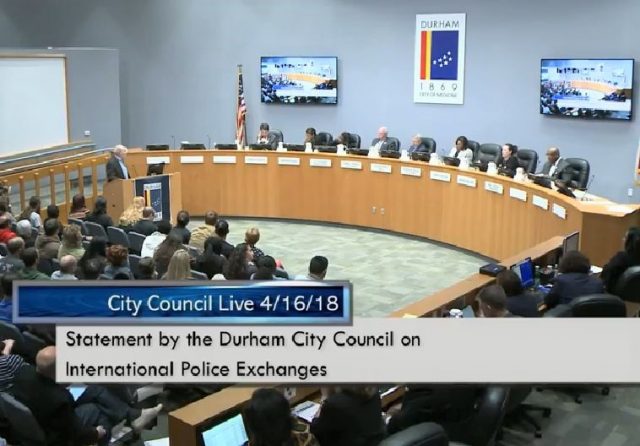
Last week Durham, North Carolina’s Human Relations Commission (HRC) disappointed the vast majority of the city’s Jewish community by rejecting a draft proposal that had urged city officials to remove reference to Israel from their April 2018 ‘Statement by Durham City Council on International Police Exchanges’.
At issue was the statement that passed unanimously on April 16t, 2018, by Durham’s City Council and which imposed a total ban on any and all law enforcement trainings with only one country in the world: Israel.
We wrote about the blood-libelous Durham City Council statement, which mentioned only Israel by name and thereby singled out police training programs there, in prior posts:
- Demonization: Durham NC City Council bans police exchanges with Israel
- Update: Durham NC Pro-Israel groups organize against City Council ban on police exchanges with Israel
As we noted, Durham became the first American city to align a municipal public policy with “Deadly Exchange”—a national campaign promoted by the virulently anti-Jewish and anti-peace extremist organization Jewish Voice for Peace (JVP) which falsely blames Israel and American Jewish organizations for U.S. domestic police militarization and instances of police violence against blacks and other minorities in America.
In our prior posts, we discussed how the City Council statement drew intense criticism from Durham’s Jewish residents and community leaders, garnered national and international attention and condemnation and eventually led to two lawsuits against the city.
Local Jewish organizations and community leaders in Durham opposed to the anti-Israel policing statement have tried to use various avenues available to them to get the City Council statement revoked—or at least revised.
In particular, the Jewish Federation of Durham-Chapel Hill and a local organization Voice for Israel petitioned the HRC to review the statement, and for awhile it looked like this advisory board would provide the Jewish community in Durham-Chapel Hill with relief.
But now their hopes have been dashed because the HRC’s final report adopted on January 8th basically “endorses” the City Council’s earlier “discrimination against Israel and the Jewish people”.
The Voice for Israel group is calling it a “second punch in the gut” (see Voice for Israel co-chair Dr. Robert Gutman’s statement exclusive to LI below).
It’s important to understand that this setback for the Jewish community in Durham will have repercussions far beyond North Carolina. In fact, it’s likely to galvanize anti-Israel activists across the country to push “Deadly Exchange” even harder at the local level.
The HRC’s decision is now being viewed as another victory by the radical and fringe Jewish Voice for Peace, which spearheaded the “Deadly Exchange” initiative in Durham and is now looking to shutter U.S.-Israel policing exchange programs in other cities, More Demonization: Jewish Voice for Peace leading effort to ban DC police training in Israel.
As we highlighted in a prior post, JVP’s nefarious “Deadly Exchange” propagandizing can be countered—provided pro-Israel groups and mainstream Jewish leaders and organizations find out about the JVP campaigning in their local communities soon enough and have the right information to mount a successful response, Anti-Semitic “Deadly Exchange” campaign can be defeated when local pro-Israel groups respond quickly.
But the poor outcome in Durham, NC is a cautionary tale for other American Jewish communities, especially in cities where far-left groups are already well-established. As in Durham, in those places JVP’s “Deadly Exchange” campaign won’t be so easily defeated. So, grassroots pro-Israel groups and major Jewish organizations should carefully review what happened in Durham and prepare accordingly.
Background: Jewish organizations in Durham file a joint complaint with the Human Relations Commission (HRC) against the City Council
In several prior posts, we reviewed JVP’s “Deadly Exchange” campaign.
As we documented, it’s a vile initiative that aims to exploit preexisting and unrelated domestic racial tensions in the U.S. to stoke hatred between Jews and other minorities, especially blacks, all in the service of building JVP’s virulently anti-Israel agenda:
- With “Deadly Exchange” Campaign, Jewish Voice for Peace moves from enabling to promoting antisemitism
- Jewish Voice for Peace doubles-down on antisemitic “Deadly Exchange” campaign
We also documented in prior posts how “Deadly Exchange” was promoted by local JVP activists and their allies in Durham, who together launched the “Demilitarize! Durham2Palestine” coalition and a sophisticated and intense PR and lobbying campaign. In this regard, it’s important to note that the April 2018 City Council statement was passed over the objection of police groups and high-ranking police officers, the vast majority of the local rabbis, the Jewish Federation of Durham-Chapel Hill, and the Anti-Defamation League.
In our prior post we provided an overview of the April 16th City Council meeting on international police exchanges, highlighting the public comments delivered there and also the remarks by various council members and the Mayor. A video of the proceedings along with excerpted clips can be found in our prior post.
It’s worth watching them to get a sense of the kind of anti-Jewish hostility and divisiveness that JVP brings into a community. At one point during the proceedings, a minister from the Nation of Islam delivered a 2-minute anti-Jewish rant, referring to a “synagogue of Satan” and accusing Jews of having an “inordinate amount of control” in city politics:
Subsequently, as we noted, Voice for Israel and the Jewish Federation filed a joint complaint with the Durham HRC, denouncing the City Council for basing its actions on “propaganda lies” promoted by JVP, “a group that has a well-documented animus toward the Jewish state.” The two organizations were invited to present their complaint in person to the commission, where they also raised concerns about the procedural and decision-making irregularities which led to the City Council’s April 16th decision.
Specifically, they called on the HRC to encourage the City Council to retract its statement, put out a new one, or at the very least strike out any mention of Israel from the extant document.
The HRC releases a subcommittee draft report in November 2018
The Jewish Federation of Durham-Chapel Hill and Voice for Israel made the right move in approaching the HRC for assistance—if there’s any local government body that could have helped it should have been this advisory board, an all-volunteer group appointed to “eradicate discrimination and to develop an atmosphere in the city conducive to good human relations”.
According to media coverage and reports issued by HRC itself, after receiving the request from the Jewish Federation and Voice for Israel the advisory panel agreed to look into the matter. Specifically, it agreed to “assess whether the statement was discriminatory and created unnecessary tensions”. A four-person subcommittee was formed to “dig into these issues” (the members were Susan Austin, Ricardo Correa, Mikel Barton, and Andrea ‘Muffin’ Hudson). They
- attended multiple community forums;
- met and spoke with various stakeholders, including leaders of local synagogues and members of the Muslim community; and
- received presentations from Voices for Israel and the Jewish Federation and Demilitarize!Durham2Palestine.
Based on the subcommittee’s reporting, it also “obtained and reviewed factual information from the Durham Police Department”.
Basically, the HRC subcommittee undertook the kind of due diligence and transparent decision making that the City Council neglected to do.
In November of last year, the subcommittee released an 8-page “Draft Report, Findings, and Recommendations on April 16 Statement by Durham City Council on International Police Exchanges” (for the full document, see here).
The draft report didn’t find the City Council statement to be intentionally antisemitic and it never once mentioned the fact that JVP—the group that spearheaded campaign to get the City Council to pass the April 16th statement in the first place—is an ADL-flagged hate group. The report also ignored the fact that that the City Council statement was viewed as a major achievement for the anti-Israel and antisemitic BDS movement.
Still, there were a lot of strengths to the November draft report.
It explicitly addressed the “key question” of whether the City Council statement was antisemitic—even embedding the US State Department definition of antisemitism into the document. It also acknowledged many of the criticisms of the Jewish community and transcribed a number of the complaints (e.g., “We think [the City Council] profoundly misunderstood what Israel means”; “We believe they unwittingly made many Durham Jews feel marginalized or unjustly singled out”).
The draft report stated that the decision-making process that the City Council used to pass the statement—waiving policies for speaking at the City Council work session; failing to put draft statements on the meeting agendas; using personal email accounts to conduct council business related to the statement; and providing little time for community residents to deliberate on the matter—“contributed to tension” and didn’t “facilitate good human relations” in Durham.
Much of the report’s recommendations focused on how the City Council could do better in the future, by making its decision-making process more transparent and accessible.
But the best part of the draft report was that it stated in a bullet point that “The City Council should revise the language” in its April 16th statement “to provide clarity based on the concerns and findings outlined here.”
The report attached the recommended revisions in red track changes.
Here, the reference to Israel in the body of the text was deleted. In its place, a footnote directed readers to the full text of police Chief C.J. Davis’s April 4, 2018 memo to the Durham City Council, which as we noted in our prior post, had been only partially reproduced in the City Council statement.
In doing so, it would have been possible for everyone to see that Davis in fact found her experience in the Atlanta Police Leadership Institute (APLI) to be highly valuable and that it didn’t involve any military-style training.
Outpouring of Jewish community support for the HRC subcommittee draft report
Given that the HRC subcommittee draft report recommended that the City Council “remove the singling out of Israel from their divisive and discriminatory April 16 statement”, it’s not surprising that it garnered considerable support from the Jewish community—including from Jewish organizational leaders, over a dozen local rabbis, synagogue leadership, the chair of North Carolina Hillel, Jewish university professors, and longtime local Jewish residents.
A number of non-Jewish influential and distinguished community members in the Durham-Chapel Hill area also wrote in to the HRC to endorse the draft.
Many of the letters in support of the subcommittee draft report which were submitted to the HRC in November and December of last year were collected on the website of Voice for Israel and can be read here.
You can see how thankful everyone was for the “breath of fresh air” that the HRC was promising to provide. Many wrote that they found the draft report “thoughtful”. The 12 Triangle rabbis noted that
We appreciate the report’s thoroughness and thoughtfulness and we believe it charts a constructive way forward for our community to heal.”
Nearly every letter writer stated something similar.
Taken together these letters convey 100% unity and wall-to-wall opposition to the City Council’s statement from across every Jewish denomination in Durham-Chapel Hill.
The letter writers described the statement as “completely unnecessary and extremely hurtful”; “painful to the Jewish community”; “ill-conceived”; “antisemitic”; “mis-informed” “threatening”; “discriminatory in nature”; and “demoniz[ing] one country in the world”.
They provided overwhelming support from the representatives of thousands of Durham-Chapel Hill residents for the HRC subcommittee draft report, and especially its recommendation to “remove the word Israel”.
In addition, a few of the letters noted that U.S.-Israel police exchanges were being unfairly maligned and slandered in the City Council statement. The Durham residents made a point of letting the HRC know that they found the city’s police “both collectively and individually, to uphold the most professional law enforcement standards.”
As one member of Judea Reform, Durham’s largest congregation in the North Carolina Triangle area, wrote:
This unfortunate resolution implies that there is a linkage between Israel, Jews, and police misconduct. Nothing could be further from the truth.”
These points were particularly important because, as we highlighted in a prior post, trainings for U.S. law enforcement in Israel, sponsored by the ADL, the Georgia Law Enforcement Exchange (GILEE), and other organizations, are designed to equip U.S. police leaders with the knowledge to safeguard communities from a range of threats, including terrorism and bombings to active shooter situations, Georgia police groups slam Jewish Voice for Peace’s antisemitic “Deadly Exchange” campaign.
It’s commendable that quite a few of Durham’s residents understand that, even if the City Council did not.The HRC subcommittee releases a revised draft report on January 6th
With all the support for the HRC subcommittee November 2018 draft report, by the following month it was looking highly likely that the full Commission would adopt it once it took a vote at its January meeting.
But that was not to be.
On January 6th, only two days before the HRC was due to convene, its subcommittee tasked with studying the April 2018 City Council statement provided the Jewish Federation and Voice for Israel with a revised report.
This gave the Jewish community less than 48 hours to prepare a response to deliver before the HRC on January 8th.
The January 6th draft report can be found here. Other than one change, noted below, this is the report that the full HRC adopted two days later, and so this is the final report of the Durham HRC.
A lot of it reads the same as the earlier draft that the Jewish community in Durham endorsed, especially in terms of recommending that the City Council be more transparent in its business and decision making in the future.
The most critical difference is that the new draft failed to call for the City Council to reconsider its policing statement, or to exclude the reference to Israel. Instead, it included some new wording, which actually recognized that the singling out of Israel had no real purpose and was of no municipal benefit:
…while mentioning Israel may not have been necessary to create a policy preventing future international military-style police exchanges, in light of the above findings, its inclusion is not deemed unwarranted, unjustified or discriminatory.”
In addition, the new draft stated in its concluding section that, because “the HRC did not find consensus” around the reference to Israel in the City Council statement, it wouldn’t be making any recommendation to have it rewritten:
We do not feel that the HRC’s attempt to revise the statement would be of service toward ameliorating tensions or providing appreciable relief from perceived harm.”
This January 6th draft noted too that “it is our understanding that the City Council does not plan to revisit their April 16th statement”, implying that this also convinced the subcommittee that recommending a re-write wouldn’t be “our best course of action” (as far as I can tell, this sentence referring to the City Council’s intentions was the only one deleted from the final report).
There are some other important differences too.
Unlike the prior draft, the re-written draft document didn’t include any of the specific criticisms to the City Council statement that were presented to the HRC by Jewish community leaders and Voice for Israel. It also presented the fringe, radical JVP and its allies (“other parties in support of the April 16th statement”) as co-equal to the Jewish community leadership and to the vast majority of Jewish residents in the area (“some parties in opposition to the April 16th statement”).
There were other troubling aspects to the re-write as well:
The earlier draft specifically referred to antisemitism and even provided a working definition of it. By contrast, the revised draft simply asked “Was the statement discriminatory?”. Even worse is that because there is no recommendation to the City Council to revise the April statement on international police exchanges, the new draft (ultimately adopted by the HRC as a final report) didn’t include the full memo from police Chief Davis, which presents U.S.-Israel police training programs in a positive light.
The day after this revised draft report was delivered to Jewish community members, Voice for Israel alerted its members that Durham’s public officials were poised to fail them yet again.
In a powerful statement titled “A Second Punch in the Gut: Updated HRC Draft Endorses Discrimination Against Israel and the Jewish People”, the group lamented the fact that the November 2018 draft had been “reversed entirely in key areas” and that it “reneges” on its prior recommendations to the City Council:
Of great concern is the shocking admission by the HRC that because the Durham City Council refuses to revisit this issue, the HRC decided to reverse their November recommendation that the City Council remove the singling out of Israel. In essence, the HRC seems to be saying that because the Durham City Council wants this issue to go away, the HRC will oblige by not asking for change. That is hardly a good faith effort to seek justice. Would the HRC treat any other group of people in such a manner?”
It’s a good question.
Why did the HRC subcommittee re-write its earlier draft report?
Why did the Durham HRC subcommittee “ignore the pleas” of twelve local rabbis, the community’s synagogues, and Jewish institutions?
One reason might have been that, once the subcommittee shared its November draft with the larger body and with the community to get feedback, there were likely to be at least a few commissioners who would have raised objections to the call for any re-write of the City Council statement.
Indeed, it’s fair to surmise that Diane Standaert, the HRC chairwoman, along with John Rooks (the HRC co-chair) would have been among the commissioners who were probably involved with drafting the January 6th subcommittee revised report.
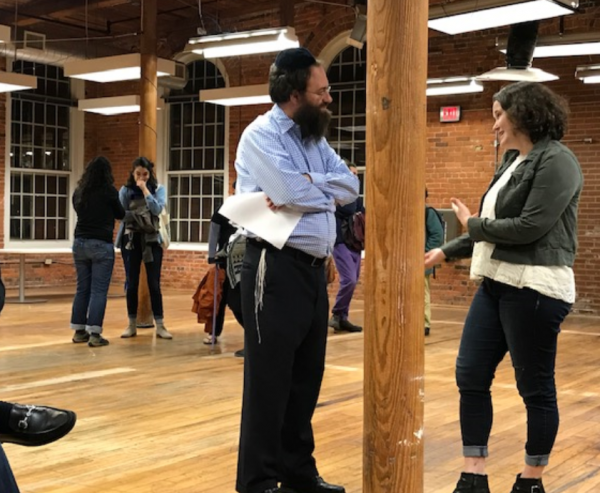
[Diane Standaert, HRC Chair with Chabad Rabbi Zalman Bluming | January 8, 2019 | Credit: Robert Gutman, Voice for Israel]
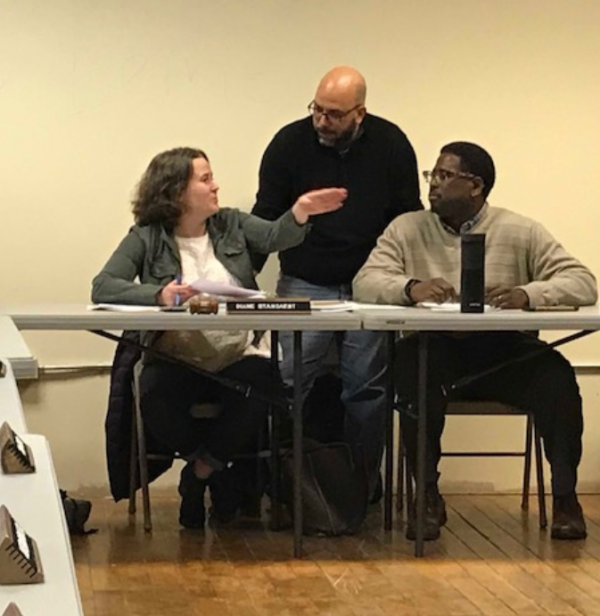
[Diane Standaert (left), Ricardo Correa, and John Rooks (right) | Credit: Robert Gutman, Voice for Israel]
It’s also possible that some commissioners were swayed by the propaganda of local JVP activists and their allies in the Demilitarize!Durham2Palestine coalition, who no doubt encouraged their members to inundate the HRC with letters, phone calls, and emails.
Below are some of the social media posts circulated in the weeks leading up to the HRC vote last week. True to form, JVP and its allies trotted out blacks, a university professor, and a Jew to lend legitimacy to “Deadly Exchange”:
When we say we're guided from the community, we mean it! Here all the way for solidarity, especially with Black people in Palestine!#SaveOurStatement#DefendOurVictory pic.twitter.com/Z5YsJLrz29
— Demilitarize! Durham2Palestine ?2️⃣?? (@Durm2Palestine) January 4, 2019
So proud to have community members like @LailaNurMusic behind us in our efforts! Durham community members, it's up to us to show up at the next Human Relations Commission to defend our victory!#SaveOurStatement#DefendOurVictory pic.twitter.com/k5oSbdVyPH
— Demilitarize! Durham2Palestine ?2️⃣?? (@Durm2Palestine) January 5, 2019
We're hoping for a new year where our community voices continue to be taken seriously. With the Human Relations Commission meeting coming up soon, we're showing out!#SaveOurStatement #DefendOurVictory pic.twitter.com/MXB1ZRmez1
— Demilitarize! Durham2Palestine ?2️⃣?? (@Durm2Palestine) January 2, 2019
So happy to have support from queer Jewish folks! Join us this year in pushing for more spaces for this, locally and nationally!#SaveOurStatement#DefendOurVictory pic.twitter.com/Aqf92lvvMB
— Demilitarize! Durham2Palestine ?2️⃣?? (@Durm2Palestine) January 3, 2019
It’s also worth watching an interview that Jazmynne Williams, the communications and social media manager for the Demilitarize!Durham2Palestine group, did with the ‘Real News Network’, a media site based in Baltimore, just three days before the HRC vote (a transcript is here):
In it, Williams (who is said to be affiliated with Black Youth Project and also JVP) and others who are featured in an accompanying video, racialize the Israeli-Palestinian conflict and stoke hatred between Jews and other minorities with false claims that Israel’s military and police ‘brutalize and terrorize’ the people of Palestine ‘as does the Durham Police Department…they brutalize and terrorize black and brown communities’.
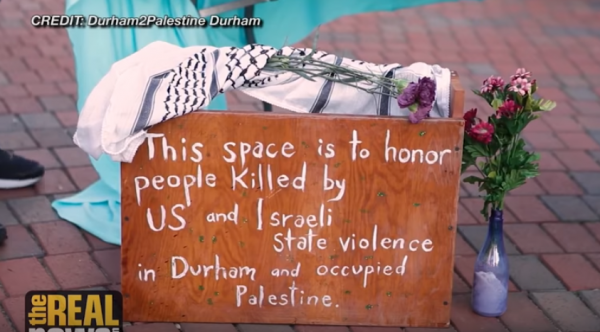
The HRC adopts the re-written subcommittee draft report on January 8th
On January 8th, the 17-member HRC voted up the subcommittee’s revised draft report that was released to the public only two days prior.
According to Voice for Israel, it was a “pro-forma vote”. Yet, as the original petitioners to the HRC, the Jewish Federation and Voice for Israel were given 10 minutes to respond.
Pilar Rocha Goldberg (CEO of El Centro Hispano), Jill Madsen (CEO of the Jewish Federation of Durham-Chapel Hill) and Bishop Ronald L. Godbee (lead Pastor of Durham’s River Church) were selected to be the scheduled speakers.
It was a good line-up, and representative of the diversity among those who objected to the City Council’s discriminatory April 2018 policing statement.
The 3-hour HRC meeting and vote wasn’t filmed and there’s no transcript of the proceedings. But a local reporter covered it and there’s two short videos worth watching here.
In the first video, Durham Human Relations Commissioner Andrea ‘Muffin’ Hudson explains why she doesn’t want to ask the City Council to change its April 2018 statement on militarized policing which singles out Israel. It’s a truly bizarre statement that actually throws into question the HRC’s mission to hold elected officials to account:Are we going to change the bible because we don’t like the words that are in the bible? No, we’re not because it was already written. The same thing with this [City Council] statement—we should not change it because it was already written”.
Hudson also jokingly expressed the view that “its highly unlikely black people will ever oppress anyone” while also managing to insinuate that Israel and “white people” are oppressors.
The second video features Jewish Federation CEO Jill Madsen, who tells the HRC that the City Council statement made her “question whether the Jewish community has a place and voice in Durham”. Noting that the local Jewish community includes some 11,000 individuals and 4100 households, she reminded the HRC that the Council’s actions caused “great concern” and that she received an “astounding” number of emails, phone calls, and letter regarding the issue.Madsen also mentioned the “hidden agendas” that can “derail the real work” that local representatives should be doing.
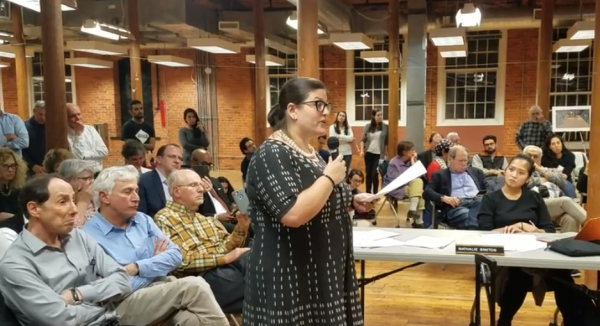
[Jill Madse,, Jewish Federation of Durham-Chapel Hill CEO | January 8, 2019 | HRC meeting, Durham, NC]
According to the local media coverage of the HRC meeting, at least one commissioner—Ricardo Correa—was having second thoughts. He had initially believed that the City Council was not discriminatory but said at the meeting “I personally do believe it was discrimination against part of the community.”
At the meeting he reportedly made a failed motion to combine the draft and final reports—and to keep the recommendation to remove mention of Israel from the City Council statement.
Correa reportedly changed his mind on the issue after reading a letter from a former commissioner Phil Seib, which encouraged him and his fellow commissioners to re-consider the omission of the recommendation to the City Council to revise its statement, even if the Mayor and the council members refused to revisit it (Seib’s letter was posted to the Voice for Israel website; in it he made a powerful plea to the HRC to “stay true” to its mission and hold Durham’s elected officials and authorities accountable, as it had done on a number of occasions in the past).
Statement exclusive for LI from Voice for Israel Co-chair Robert Gutman
I reached out to Voice for Israel co-chair Robert Gutman to find out more about the process that led to the HRC’s shameful decision to backtrack on their earlier report.
Gutman shared a great deal of information with me and also copied me on several round-robin email exchanges with other members of the Triangle Jewish community, who have been trying to process their “disappointment” from last week’s meeting where they were all so poorly served by the HRC.
Here’s a statement he provided to me via email:
The Durham, NC City Council issued a highly inflammatory antisemitic discriminatory statement under the guise of a policing policy prohibiting military training by ‘all countries’ in April 2018. The statement singled out Israel without any evidence of causality. The mainstream Jewish community including three synagogues, 12 rabbis, the Federation and a local pro-Zionist organization (Voice for Israel) was rebuffed in their appeal to the city’s Human Relations Commission.
We were aware that labeling the instigators as deliberately antisemitic would immediately make us unwelcome given the makeup of the Commission. So, we asked for relief from the discrimination instead. Four members of the Commission had signed the original petition to the City Council. Despite our request that they be recused, they were allowed to vote. Nevertheless, the initial judgment of the Human Relations Commission’s appointed sub-committee was that the Jewish community had been treated in a discriminatory manner. But then several members of the full body objected on the basis that Palestinian members of the community would be offended if the discrimination by the Council was criticized by the Commission.
On January 8th the full body voted to condone the discrimination. In the process the Council leadership limited us to 10 minutes and let many lies spoken by the petitioners to be uttered without objection. The Commission, largely constituted by people who themselves had a history of they or their families being subjected to discrimination, referred to the color of our skin as justification for supporting the Council’s discrimination. The petitioners consisted of ten groups (including one controlled by a Council member) led by Jewish Voice for Peace. As they planned, this allowed the Commission to claim that the City Council statement was not antisemitic because Jews were in favor of it”.
Conclusion – JVP instigates antisemitism and exploits unrelated racial tension to demonize and dehumanize Israelis and Israel supporters
The morning after Durham’s Human Rights Commission voted in favor of a report that essentially catered to the agenda of the fringe, radical Jewish Voice for Peace (JVP), the group showcased on social media a drawing of a Jewish woman holding hands with a Palestinian woman armed with an assault rifle and bullets—then, in a series of tweets that were later deleted, JVP defended sharing the violent image on the grounds that Palestinians have the “right to resist military occupation”:
Being Jewish is *not* the same as being zionist!
Artwork by Lisa Kokin for the Jewish Alliance Against Zionism, 1978, courtesy of the Palestine Poster Project pic.twitter.com/FADkVP0E0i
— Jewish Voice for Peace (@jvplive) January 9, 2019
The shared image and the tweets drew considerable derision and ridicule, with many people pointing out that the drawing, and JVP’s subsequent justification of it, legitimized terrorism and failed to promote peace (at least one respondent also correctly noted that the image is bigoted towards Palestinians by “promoting the idea of Palestinians as inherently violent”).
More fringe @jvplive hatred funded by @RockBrosFund. Not Jewish, not peace, not moral. #Enough https://t.co/HFimB7Zn3C
— Prof Gerald M Steinberg (@GeraldNGOM) January 11, 2019
To anyone who has been paying attention to JVP’s activism in recent years, this latest example of how this group isn’t in any way a voice for Arab-Israeli peace or reconciliation should come as no surprise. In dozens of posts, we’ve highlighted similar instances in which JVP has glorified and supported terrorists and promoted the agenda of killers.
We’ve also documented scores of instances in which JVP has exploited the Jewish identity of its leaders and membership to give cover to the antisemitism of its allies, Jewish Voice for Peace – “Jew-washing” the anti-Israel movement.
Now, with its latest “Deadly Exchange” campaign, it’s jumped the shark—not only are JVP activists enabling and rushing to defend their anti-Jewish friends, they’re also becoming key purveyors of antisemitism themselves.
So, this is who the 17 members of Durham’s HRC uplifted and what they condoned on January 8th. Shame on them.
Miriam F. Elman is an Associate Professor of Political Science and the Inaugural Robert D. McClure Professor of Teaching Excellence at the Maxwell School of Citizenship & Public Affairs, Syracuse University. She is the editor of five books and the author of over 65 journal articles, book chapters, and government reports on topics related to international and national security, religion and politics, and the Israeli-Palestinian conflict. She also frequently speaks and writes on the Boycott, Divestment, and Sanctions (BDS) anti-Israel movement. Recently, Elman was included on the Algemeiner newspaper’s 2018 list of the top 100 people worldwide who are “positively influencing Jewish life.” Follow her on Facebook and Twitter @MiriamElman
 DONATE
DONATE
Donations tax deductible
to the full extent allowed by law.

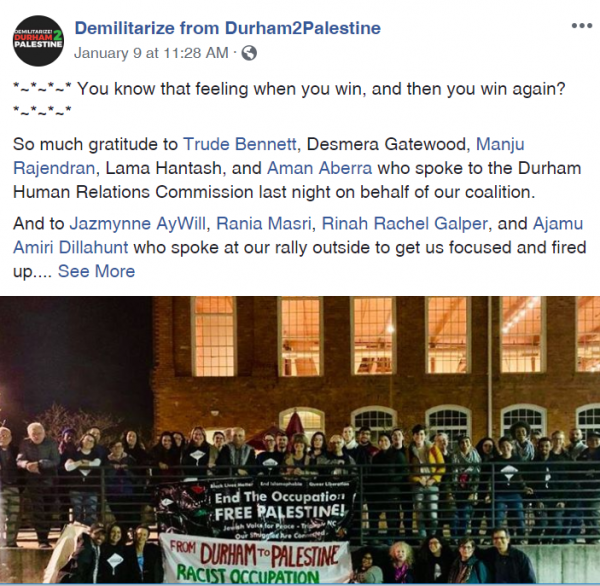
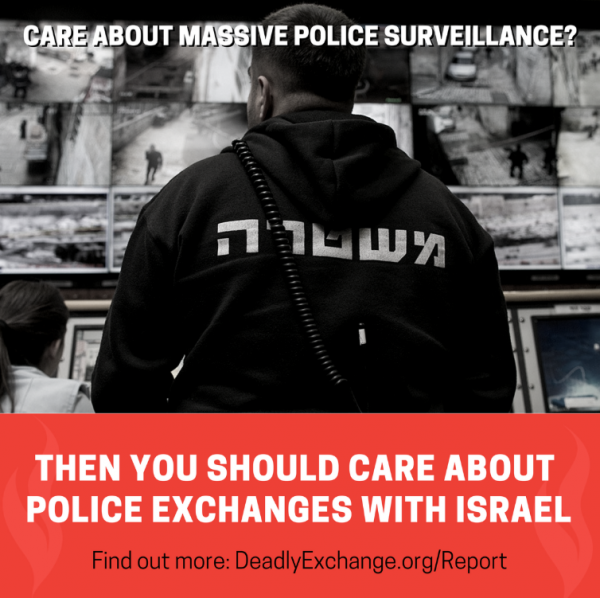
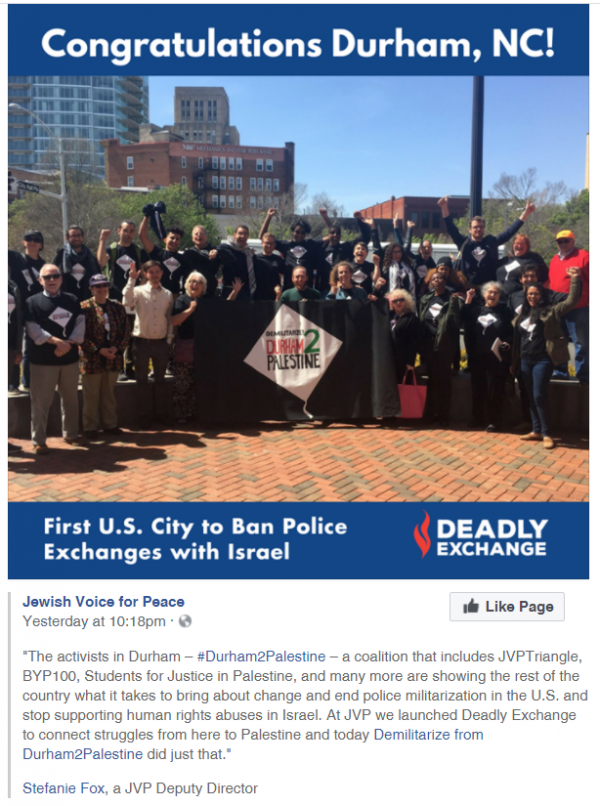
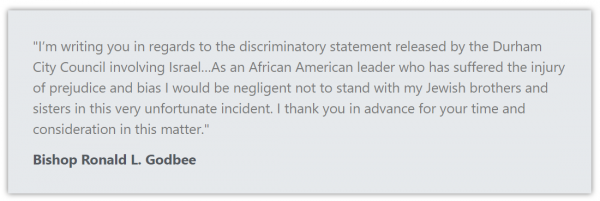
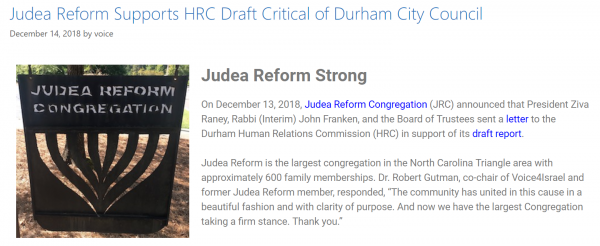
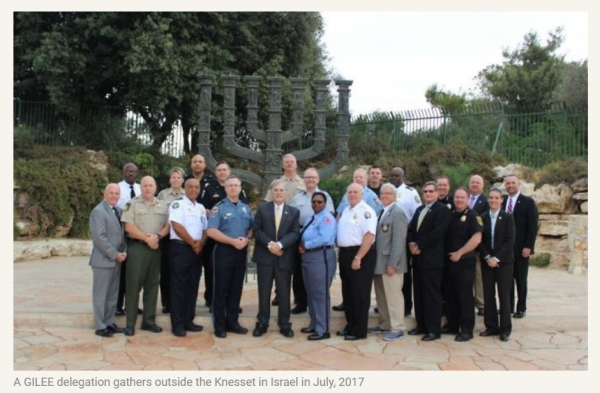
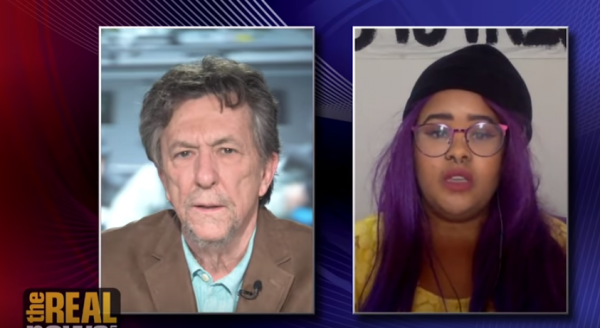
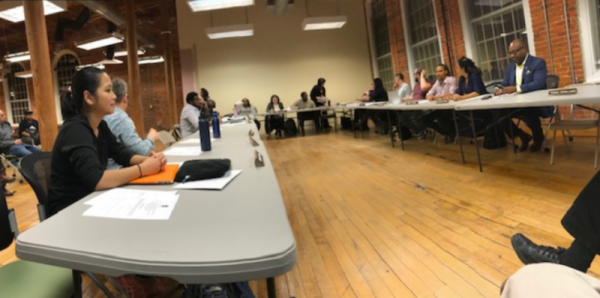
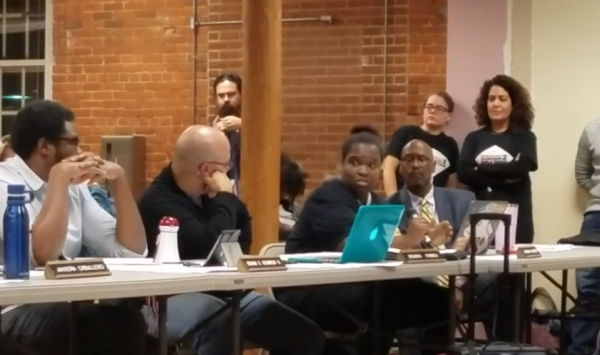
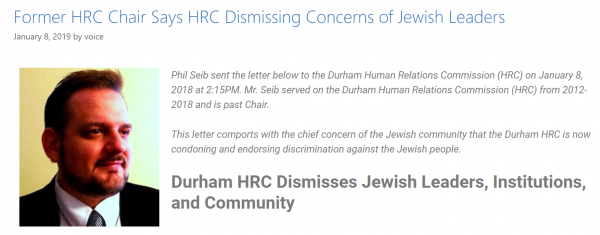







Comments
Please use quotes around the word “Jewish” in “Jewish” Voice for Peace. They represent neither the Jewish People or Peace.
To designate a person who claims ethnic Semitic heritage but rejects the biblical history of the 12 Tribes and the State of Israel:
Jew-ish.
A number of Jews I know well as friends and family warn that “jewish” has become a political identity for a growing number of people and not a religious identity. It is “ethnic” to them only for political value. For those around NY/LI, they cite the number of “jewish” people who have rarely if ever seen the inside of a synagogue and perhaps couldn’t tell you when Sukkot is or even what it is.
So what is new? Biblical Israel had its “social” Jews and The Exodus had a fair number despite literally having G_d’s guidance manifested both day and night. “Police State”…. These malcontents never experienced what it is like under a police state and are too far removed from the reality to know that what they support brings death…even if just to a “social” Jew.
The KKK has always been strong in North Carolina. Now, they have changed their initials to BDS and JVP. I understand how the anti-semites got a bunch of left-wing quislings to appear on their propaganda, but I don’t understand how they got a rabbi to show his face on their trash.
Antisemitism must be denounced wherever it occurs. My father taught me that there is only one place that a swastika should be displayed: Below the cockpit rail of an Allied aircraft, commemorating the destruction of a Nazi aircraft or ship. (He proudly displayed two swastikas below his cockpit.)
JVP – full of the kinds of Jews who would have happily loaded up the cattle carts in the 40’s.
To the Jewish population of Raleigh-Durham:
Time to leave.